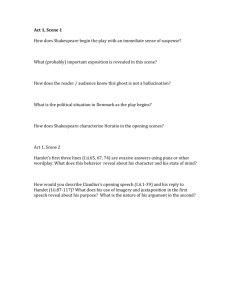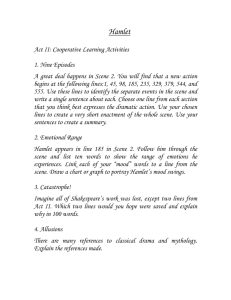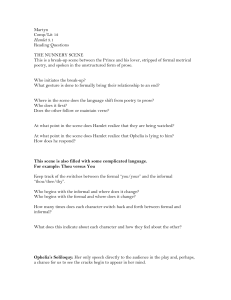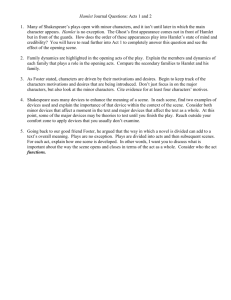Here - Lincoln School
advertisement
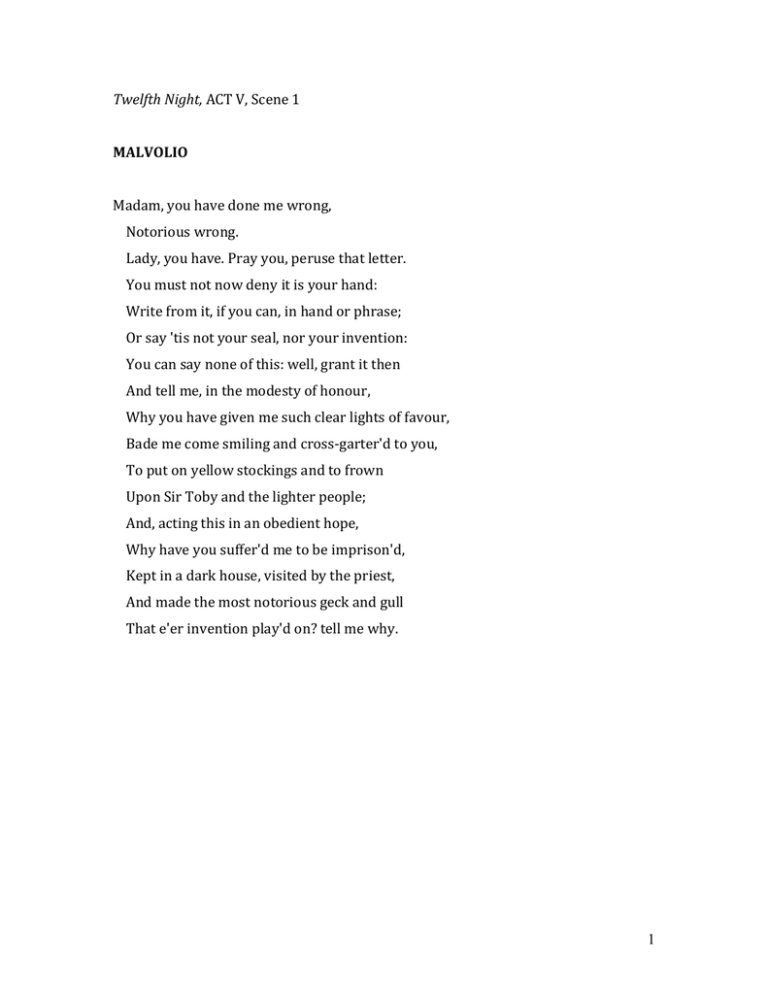
Twelfth Night, ACT V, Scene 1 MALVOLIO Madam, you have done me wrong, Notorious wrong. Lady, you have. Pray you, peruse that letter. You must not now deny it is your hand: Write from it, if you can, in hand or phrase; Or say 'tis not your seal, nor your invention: You can say none of this: well, grant it then And tell me, in the modesty of honour, Why you have given me such clear lights of favour, Bade me come smiling and cross-garter'd to you, To put on yellow stockings and to frown Upon Sir Toby and the lighter people; And, acting this in an obedient hope, Why have you suffer'd me to be imprison'd, Kept in a dark house, visited by the priest, And made the most notorious geck and gull That e'er invention play'd on? tell me why. 1 Hamlet – Act V Scene 1 HAMLET Alas, poor Yorick! I knew him, Horatio: a fellow of infinite jest, of most excellent fancy: he hath borne me on his back a thousand times; and now, how abhorred in my imagination it is! my gorge risess at it. Here hung those lips that I have kissed I know not how oft. Where be your gibes now? your gambols? your songs? your flashes of merriment, that were wont to set the table on a roar? Not one now, to mock your own grinning? Now get you to my lady's chamber, and tell her, let her paint an inch thick, to this favour she must come; make her laugh at that. 2 Hamlet – Act IV Scene 7 QUEEN GERTRUDE There is a willow grows aslant a brook, There with fantastic garlands did she come There, on the pendent boughs her coronet weeds Clambering to hang, an envious sliver broke; When down her weedy trophies and herself Fell in the weeping brook. Her clothes spread wide; And, mermaid-like, awhile they bore her up: Which time she chanted snatches of old tunes; As one incapable of her own distress, Or like a creature native and indued Unto that element: but long it could not be Till that her garments, heavy with their drink, Pull'd the poor wretch from her melodious lay To muddy death. 3 Hamlet – Act III, Scene 1 HAMLET To be, or not to be: that is the question: Whether 'tis nobler in the mind to suffer The slings and arrows of outrageous fortune, Or to take arms against a sea of troubles, And by opposing end them? To die: to sleep; No more; and by a sleep to say we end The heart-ache and the thousand natural shocks That flesh is heir to, 'tis a consummation Devoutly to be wish'd. To die, to sleep; To sleep: perchance to dream: ay, there's the rub; For in that sleep of death what dreams may come When we have shuffled off this mortal coil, Must give us pause: there's the respect That makes calamity of so long life; Thus conscience does make cowards of us all. 4 Hamlet – Act I, Scene 2 HAMLET How weary, stale, flat and unprofitable, Seem to me all the uses of this world! Fie on't! O fie! 'tis an unweeded garden, That grows to seed; things rank and gross in nature Possess it merely. That it should come to this! But two months dead! -nay, not so much, not two: So excellent a king; that was, to this, so loving to my mother Heaven and earth! Must I remember? why, she would hang on him, and yet, within a month-Let me not think on't--Frailty, thy name is woman!-- 5 Hamlet – Act I, Scene 2 HAMLET --Frailty, thy name is woman!-A little month, or ere those shoes were old With which she follow'd my poor father's body, O God! A beast would have mourn'd longer— --married with my uncle, My father's brother, but no more like my father Than I to Hercules: within a month: She married. It is not nor it cannot come to good: But break, my heart; for I must hold my tongue! 6 Hamlet – Act II, Scene 1 OPHELIA O my lord, my lord, I have been so affrighted! My lord, as I was sewing in my closet, Lord Hamlet, with his doublet all unbrac'd, Pale as his shirt, his knees knocking each other, And with a look so piteous in purport As if he had been loosed out of hell To speak of horrors- he comes before me. He took me by the wrist and held me hard; Then goes he to the length of all his arm, And, with his other hand thus o'er his brow, He falls to such perusal of my face As he would draw it. 7 Hamlet – Act I, Scene 3 POLONIUS Yet here, Laertes? There- my blessing with thee! And these few precepts in thy memory Look thou character. Give every man thine ear, but few thy voice; Take each man's censure, but reserve thy judgment. Costly thy habit as thy purse can buy, But not express'd in fancy; rich, not gaudy; For the apparel oft proclaims the man, Neither a borrower nor a lender be; For loan oft loses both itself and friend, And borrowing dulls the edge of husbandry. This above all- to thine own self be true, And it must follow, as the night the day, Thou canst not then be false to any man. Farewell. My blessing season this in thee! 8 Twelfth Night, ACT V, Scene 1 MALVOLIO Pray you, peruse that letter. You must not now deny it is your hand: Write from it, if you can, in hand or phrase; Or say 'tis not your seal, nor your invention: You can say none of this: well, grant it then And tell me, in the modesty of honour, Why you have given me such clear lights of favour, Bade me come smiling and cross-garter'd to you, To put on yellow stockings and to frown Upon Sir Toby and the lighter people; And, acting this in an obedient hope, Why have you suffer'd me to be imprison'd, Kept in a dark house, visited by the priest, And made the most notorious geck and gull That e'er invention play'd on? tell me why. 9 Hamlet – Act II, Scene 2 HAMLET I have heard That guilty creatures, sitting at a play, Have by the very cunning of the scene Been struck so to the soul that presently They have proclaim'd their malefactions; For murder, though it have no tongue, will speak With most miraculous organ, I'll have these Players Play something like the murder of my father Before mine uncle. I'll observe his looks; I'll tent him to the quick. If he but blench, I know my course. The play's the thing Wherein I'll catch the conscience of the King. [Exit] 10 Twelfth Night – Act I, Scene 1 Duke Orsino If music be the food of love, play on; Give me excess of it, that, surfeiting, The appetite may sicken, and so die. That strain again! it had a dying fall: O, it came o'er my ear like the sweet sound, That breathes upon a bank of violets, Stealing and giving odour! Enough; no more: 'Tis not so sweet now as it was before. O spirit of love! how quick and fresh art thou, That, notwithstanding thy capacity Receiveth as the sea, nought enters there, Of what validity and pitch soe'er, But falls into abatement and low price, Even in a minute: so full of shapes is fancy That it alone is high fantastical. 11 Twelfth Night - Act I, Scene 4 Olivia 'What is your parentage?' 'Above my fortunes, yet my state is well: I am a gentleman.' I'll be sworn thou art; Thy tongue, thy face, thy limbs, actions and spirit, Do give thee five-fold blazon: not too fast: soft, soft! Unless the master were the man. How now! Even so quickly may one catch the plague? Methinks I feel this youth's perfections With an invisible and subtle stealth To creep in at mine eyes. Well, let it be. What ho, Malvolio! 12 Twelfth Night – Act IV, Scene 3 Sebastian This is the air; that is the glorious sun; This pearl she gave me, I do feel't and see't; And though 'tis wonder that enwraps me thus, Yet 'tis not madness. Where's Antonio, then? His counsel now might do me golden service; For though this accident and flood of fortune So far exceed all instance, all discourse, That I am ready to distrust mine eyes And wrangle with my reason that persuades me To any other trust but that I am mad Or else the lady's mad; yet, if 'twere so, She could not sway her house, command her followers, Take and give back affairs and their dispatch With such a smooth, discreet and stable bearing As I perceive she does: there's something in't That is deceiveable. But here the lady comes. 13
